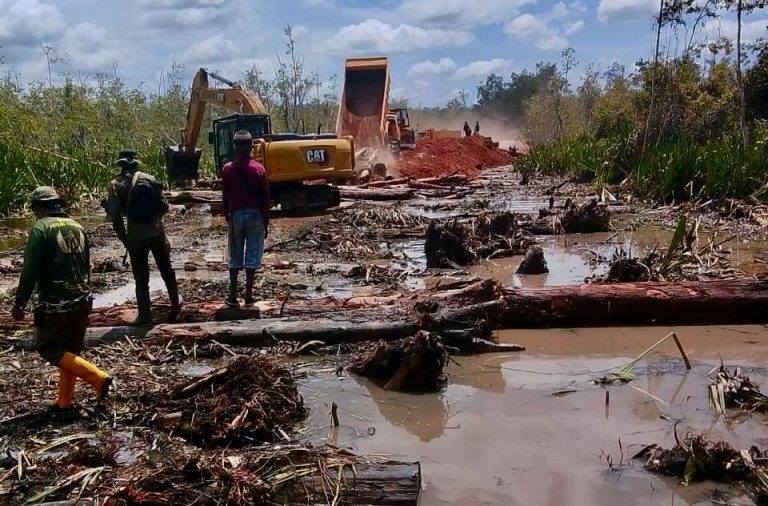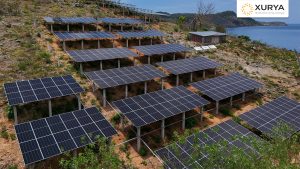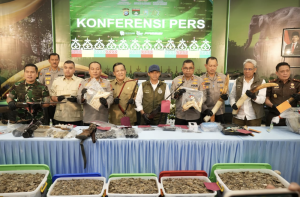Jakarta — Civil society groups in a statement on Tuesday, November 11, voiced frustration that Indonesia’s pavilion at COP30 has failed to represent the country’s most vulnerable communities, despite official claims of inclusivity and ambition. The delegation, led by Hashim Djojohadikusumo on behalf of President Prabowo Subianto, emphasised Indonesia’s progress in reducing deforestation and boosting renewable energy, along with its commitment to achieving net-zero emissions by 2060 or sooner.
But the tone of the pavilion, themed “Accelerating Substantial Actions of Net Zero Achievement through Indonesia High Integrity Carbon,” struck many activists as overly transactional. The pavilion features over 50 events, mostly highlighting carbon market opportunities— including the first-ever “seller meet buyer” forum, projected to generate USD 7.7 billion annually through 90 million tons of tradable carbon units.
“The focus on carbon trading makes Indonesia’s COP30 mission look more like a business expo than a climate forum,” said Maikel Peuki, Executive Director of WALHI Papua, during a public dialogue hosted by the Civil Society Alliance for Climate Justice (ARUKI). “It ignores the realities of Indigenous Peoples and vulnerable communities. Even worse, the government continues to push corporate-driven solutions like coal co-firing that deepen ecological harm.”
Peuki cited Papua’s accelerating forest loss — about 1.3 million hectares between 2001 and 2019 — driven by palm oil and mining, including 9,835 hectares of primary forest cleared in Merauke’s national strategic projects. He said government narratives about carbon integrity ring hollow when deforestation targets still allow up to 10.47 million hectares to be removed by 2030.
Community leaders from other regions told similar stories. In Bangka Belitung, deforestation and unrehabilitated mining pits have created deadly hazards and recurring floods. In South Sulawesi, disabled women face exclusion from disaster response. Fishermen from Ternate, such as Gofur Kaboli, demanded that climate decisions safeguard small-scale fishers from extreme weather.
Ahmad Subhan Hafidz, Executive Director of WALHI Bangka Belitung, said that the destruction of Bangka Belitung is not only environmental damage but also affects human safety. For example, mining pits are abandoned without being repaired. He said that in the Bangka Belitung Islands, massive deforestation occurred between 2014 and 2020, resulting in the loss of 460,000 hectares of tropical forest from a total land area of 1.6 million hectares.
Civil society groups under the JustCOP coalition urged Indonesia to broaden its definition of a “just transition” to include land rights, community energy, and accessible adaptation finance. They also called for non-bureaucratic climate funding mechanisms that channel support directly to Indigenous, coastal, and disabled communities.
Indonesia’s uneven energy transition
UNFCCC Executive Secretary Simon Stiell, opening COP30 in Belem, warned that the world no longer has excuses to delay the shift away from fossil fuels. “We’ve agreed to transition from fossil energy. Now we must focus on doing it justly and orderly,” he said, emphasising that doubling renewable capacity and efficiency must be central to every country’s roadmap.
Yet Indonesia’s policies continue to lean on coal and gas. The 2025–2034 National Electricity Supply Plan and the 2025–2045 National Power Plan still allocate more than 60% of the energy mix to fossil fuels, despite President Prabowo’s global pledge to reach 100% clean energy within a decade. “If this is not corrected, those promises will remain rhetoric,” warned CERAH Executive Director Agung Budiono.
Greenpeace Indonesia’s Leonard Simanjuntak said Indonesia’s energy transition remains “transactional,” prioritising the interests of fossil-fuel oligarchs over human and planetary survival. Data from Trend Asia and CREA show that 20 coal power plants alone could cause 156,000 premature deaths and economic losses exceeding Rp1,800 trillion by 2050.
Renewable campaigner Beyrra Triasdian added that Indonesia’s Second Nationally Determined Contribution (SNDC) “is filled with false solutions,” classifying gas as a low-carbon fuel and offering little support for community-based renewables.
As COP30 discussions continue in Belem, Indonesia faces a dual challenge: to prove that its climate diplomacy is not just a marketplace for carbon but a platform for justice—one that amplifies the voices of those living with the costs of extraction and exclusion. (nsh)
Banner photo: Heavy equipment is destroying forests that the Yei tribe has long inhabited. The PSN Food Estate project in Merauke, South Papua, is destroying customary forests, damaging traditional crops, eliminating food crops and even the sacred territory of the Kwipalo clan. Source: PUSAKA















